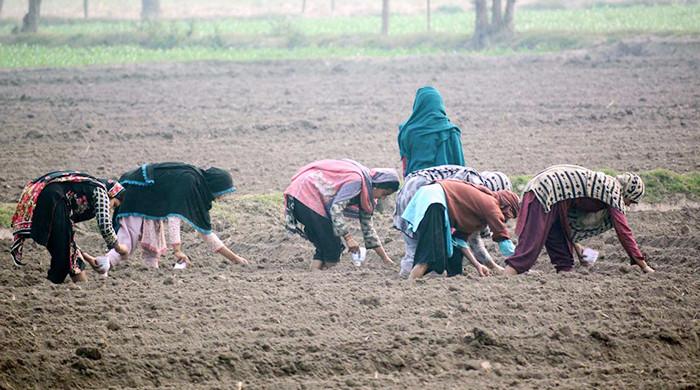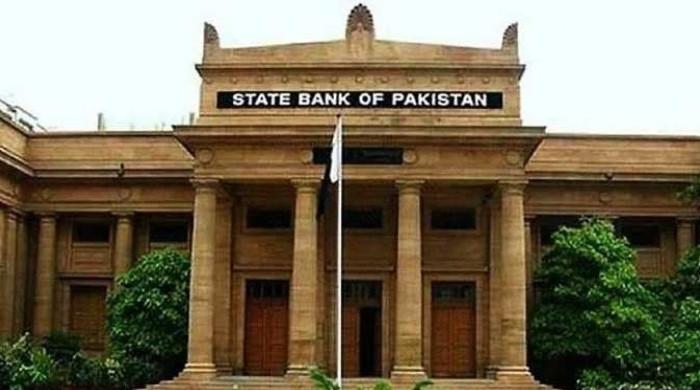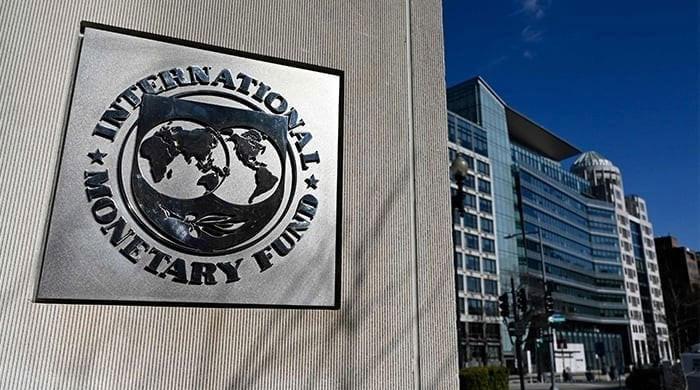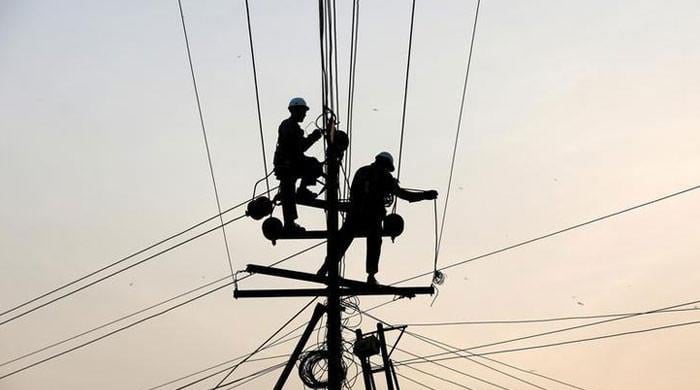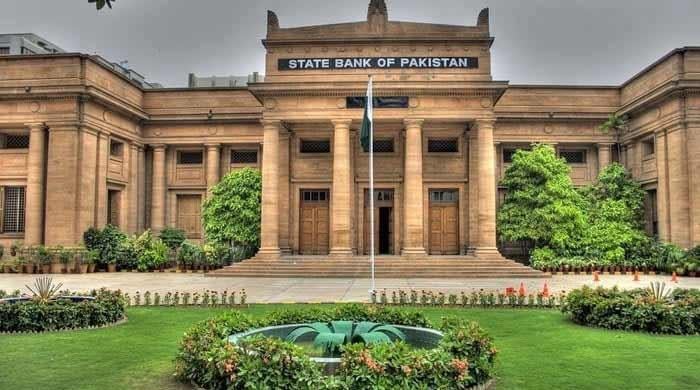Sindh CM unveils Rs1.24tr budget amid opposition protest
Sindh is hoping to generate revenue receipts worth Rs1.22 trillion against its total expenditure and has not announced any new taxes
June 18, 2020
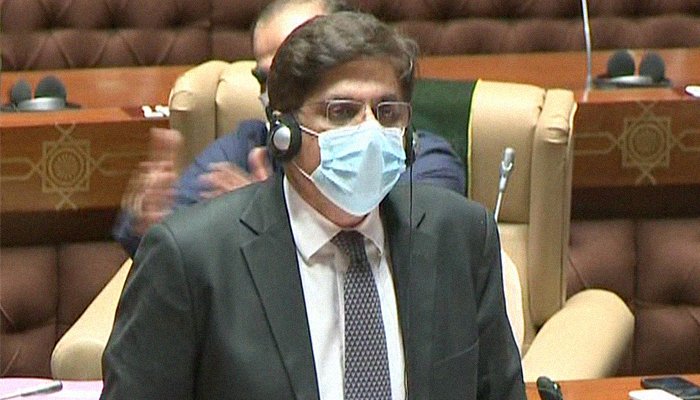
KARACHI: Sindh government on Wednesday unveiled the budget for the fiscal year 2020-21 with a total outlay of Rs1.24 trillion with an estimated narrow deficit despite decreasing inflows from the federal divisible pool, amid protests by the opposition lawmakers, reported The News.
The province is hoping to generate revenue receipts worth Rs1.22 trillion against its total expenditure. The provincial government has also not announced any new taxes and envisaged a deficit of Rs18.38 billion for the upcoming fiscal year.
Sindh Chief Minister Murad Ali Shah presented the budget in the Sindh Assembly on Wednesday amid ruckus in the assembly. The opposition chanted slogans and were carrying banners inscribed with slogans against the provincial government. The house decorum was ignored throughout the process.
Earlier in the day, the Sindh cabinet approved a 10% raise in salaries for employees from grade 1 to 16 and 5% raise from grade 17 to 22. The raise in salaries will also be part of the budget expenditures. Shah said a total of Rs313.39 billion would be collected from provincial receipts.
“It is important to highlight here that for the next financial year, we have tried to align our development as well as non-development expenditure priorities in line with the post-COVID-19 situation,” the chief minister said among the opposition's onslaught.
“In order to achieve the provincial target in receipts, the revenue collecting agencies are being strengthened with increased emphasis on automation. Moreover, monitoring mechanisms will also be developed to monitor provincial receipts, the chief minister announced.
As the cacophonous opposition drowned Chief Minister Murad Ali Shah's budget speech, he said the provincial government received 31% lesser funds from the federal divisible pool.
“Standing in the 12th month in the current financial year we have received a total of Rs525.1 billion,” Shah said. “Thus, in actual terms, we received Rs240.6 billion short of the budget estimates.”
Shah said the total receivables from the federal government for the current fiscal year stand at Rs760.3 billion, wherein Rs679.7 billion is share from the divisible pool, Rs62.3 billion are straight transfers and Rs18.3 billion in respect of grants to offset the losses on account of abolition of Octroi Zila Tax.
The federal government had set the Federal Board of Revenue’s revenue collection target at Rs5.55 trillion for FY2020. According to the share distribution formula, the Government of Sindh was to receive Rs835.3 billion. In reality, the federal government conveyed revised estimates at a total of Rs606.7 billion at the year-end, Shah said.
The government has reset a target of Rs4.9 trillion for the FBR for the next fiscal year. Sindh was conveyed its anticipated federal transfers under NFC share distribution formula. Shah said the provincial government initiatives and resources have to be redirected to save precious lives and a potentially decelerating economy in the wake of the disastrous effects of Covid-19.
“COVID-19 was primarily a threat to existing health systems, and subsequently extended its impact to all facets of life, as it grew in size and reach, at a massive scale,” he said in the budget speech.
“The government of Sindh did not rely on lockdown alone. We diverted our resources towards providing better health facilities, and towards supporting the common man facing a potential meltdown, as the economy came to a near standstill as a result of an imminent national lockdown.”
The chief minister said the Sindh government focused on addressing the social and economic impact of coronavirus, due to which a large segment of the low-income groups were affected owing to slow economic activity.
“Due to this, the provincial government exempted payment of taxes relating to property, motor vehicles, professions, trades, callings and employment and announced 20% concession in tuition fee for the months of April and May 2020 for students studying in private sector along with several other measures,” he said.
“It seems like the federal government has not grasped the concept or the efficacy of teamwork. At a time when our frontline workers and our hospitals needed the most support, they have instead made a bid to take over the running of three of our major hospitals.” He announced Rs 5 bn for COVID-19 response.
Alluding to PM's hint at the 18th Amendment and revision of NFC, the chief minister protested that while the country is facing the grave challenges of COVID-19, some quarters are attempting to raise an issue for revisiting the contents of the 18th Constitutional Amendment passed in 2010.
“Not only the 18th Amendment is being discussed, but share distribution formula of NFC awards is also being questioned,” he said. “I would reiterate our commitment to stand for the autonomy given to provinces by the 18th Amendment. We will not compromise our principled stand on the constitutional amendment in the public interest.”
Shah said unemployment is on the rise, businesses are at a standstill and small medium-term enterprises need assistance for revival in post-COVID-19 scenario. He proposed social protection and economic sustainability package of Rs34.2 billion for the next financial year 2020/21 for ensuring food security, reducing inflation and unemployment.
Health continues to remain the third largest sector with allocation for current revenue expenditure of Rs120 billion and development, including foreign project assistance at Rs15.5 billion. Total current revenue expenditure was budgeted at Rs139.1 billion and allocation for development schemes at Rs23.5 billion. The budget of the health department was divided into two major segments i.e. health services and medical education. The budget estimates for health department for 2019/20 was Rs120.486 billion, which was increased to Rs139.178 billion for 2020/21.
The budget of the education sector has been increased to Rs244.5 billion, compared with Rs212.4 billion a year earlier.
“Despite resource constraints we have allocated funds which are 25.2% of our current revenue budget,” the chief minister told the Sindh Assembly in the middle of the agitating opposition.
The education sector was divided into three broad categories: school education, college education and higher education. Total Rs9.5 billion was allocated for Sindh Education Foundation. For enhancing technology-based interventions in college education department, Rs451 million was allocated in the next fiscal year. Five billion rupees were proposed for grants to universities, Rs2 billion to educational boards and Rs1.2 billion for scholarships to position holders/A-1 grader in Sindh. Besides, Rs392 million was allocated for cadet colleges and Rs259 million for various public schools.
The chief minister warned the agriculture sector is faced with a twin threat this year. “In addition to the COVID-19 crisis, and an existential threat of locust is looming on economic horizon of Sindh,” he said. Summer crops are expected to sustain yield losses 303,109 tons and winter crops 340,077 tons this year.
“Sindh is determined to improve the conditions in agriculture sector by increasing the overall budget to Rs14. 8 billion in the next financial year 2020/21, in comparison with an allocation of Rs10.6 billion in the financial year 2019/20,” Shah added.
The government of Sindh announced a budget of Rs113.87 billion for law and order with an increase of Rs4 billion as compared to previous years i.e. 109 billion. It allocated Rs113.87 billion for the home department compared to Rs109.79 billion a year earlier. The budgetary allocations include Rs102.16 billion for Sindh police, Rs7.23 billion for home administration and Rs4.48 billion for jails.
Originally published in The News




